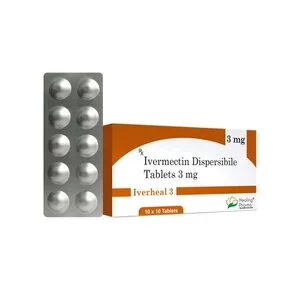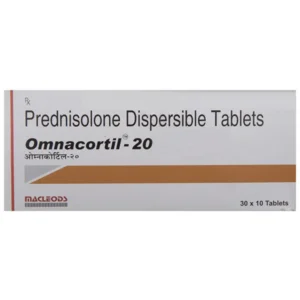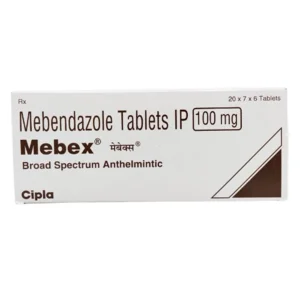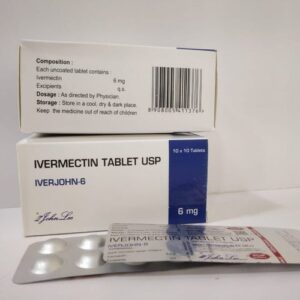Table of Contents
ToggleIntroduction Ivermectin 3 mg tablet
Ivermectin 3 mg tablet is a medication that is primarily used to treat parasitic infections in humans and animals. It has been shown to be effective against a variety of parasites, including roundworms, mites, and lice.
In recent times, there has been some controversy surrounding the use of ivermectin as a treatment for Coronavirus. Some studies have suggested that it may have antiviral properties and could potentially be effective in treating Coronavirus, while others have found no significant benefits. It’s important to note that the use of ivermectin for Coronavirus is not yet approved by the FDA or other regulatory agencies, and more research is needed to determine its effectiveness and safety for this use.
Regarding the dosage of ivermectin, it varies depending on the condition being treated, the patient’s weight, and other factors. The standard dose for treating parasitic infections in adults is usually between 150 and 200 micrograms per kilogram of body weight, but this may differ depending on the specific infection being treated. It’s important to follow your doctor’s instructions and not to self-medicate with ivermectin or any other medication.
Uses of Ivermectin 3 mg tablet
Ivermectin 3 mg is primarily used to treat parasitic infections in humans. It is effective against a variety of parasites, including roundworms, mites, and lice. Some of the specific uses of ivermectin 3 mg include:
- Treatment of strongyloidiasis: Ivermectin is an effective treatment for strongyloidiasis, an infection caused by a type of roundworm that lives in the small intestine.
- Treatment of onchocerciasis: Ivermectin is used to treat onchocerciasis, also known as river blindness. This is a parasitic infection that is spread by the bites of infected blackflies and can cause severe itching, skin lesions, and blindness.
- Treatment of scabies: Ivermectin is also used to treat scabies, a highly contagious skin infestation caused by a mite that burrows into the skin.
- Treatment of head lice: Ivermectin is sometimes used as a treatment for head lice when other treatments have failed.
It’s important to note that the use of ivermectin for Coronavirus is not yet approved by regulatory agencies and more research is needed to determine its effectiveness and safety for this use.
Side Effects
Like any medication, Ivermectin 3 mg can have side effects. However, not everyone who takes the medication will experience side effects. Some common side effects of ivermectin include:
- Nausea
- Vomiting
- Diarrhea
- Dizziness
- Headache
- Fatigue
- Abdominal pain
- Loss of appetite
- Itching
- Skin rash
More serious side effects of ivermectin are rare but can occur, especially at higher doses. These can include:
- Severe allergic reactions such as anaphylaxis can cause difficulty breathing, hives, and swelling of the face, lips, tongue, or throat.
- Neurological effects such as confusion, tremors, and seizures.
- Liver injury can cause yellowing of the skin or eyes, dark urine, and abdominal pain.
If you experience any of these serious side effects, you should stop taking ivermectin and seek immediate medical attention. It’s important to talk to your doctor about any concerns you have regarding the use of ivermectin and any potential side effects.
Benefits of Ivermectin 3 mg
The primary benefit of the Ivermectin 3 mg tablet is its effectiveness in treating parasitic infections in humans. It has been used for several decades as a safe and effective treatment for various parasitic infections, including strongyloidiasis, onchocerciasis, and scabies.
In addition, some studies have suggested that Ivermectin 3 mg tablet may have antiviral properties and could potentially be effective in treating Coronavirus. However, it’s important to note that the use of Ivermectin 3 mg tablet for Coronavirus is not yet approved by regulatory agencies and more research is needed to determine its effectiveness and safety for this use.
Ivermectin 3 mg tablet is also relatively affordable and easily accessible, making it an important treatment option in areas where parasitic infections are common.
It’s important to note that the use of Ivermectin 3 mg should always be under the guidance of a healthcare professional, as the medication can have potential side effects and interactions with other medications.
Dosage of Ivermectin 3mg
The dosage of Ivermectin 3mg depends on the condition being treated and the patient’s weight. It’s important to always follow the dosage instructions given by your healthcare provider. The following are general guidelines for the dosages of Ivermectin 3mg for different conditions:
- For the treatment of strongyloidiasis: The typical adult dose is 200 micrograms per kilogram of body weight as a single dose. This can be repeated after one or two weeks if necessary.
- For the treatment of onchocerciasis: The typical adult dose is 150 micrograms per kilogram of body weight as a single dose. This can be repeated every six to twelve months.
- For the treatment of scabies: The typical adult dose is a single dose of 200 micrograms per kilogram of body weight. This can be repeated after one or two weeks if necessary.
- For the treatment of head lice: The typical adult dose is a single dose of 200 micrograms per kilogram of body weight.
Again, it’s important to follow your healthcare provider’s instructions and not to self-medicate with Ivermectin 3mg or any other medication.
FAQs
Is Ivermectin 3 mg safe?
Ivermectin 3 mg is generally safe when used as directed by a healthcare provider. However, like any medication, it can have potential side effects and interactions with other medications. It’s important to follow the dosage instructions given by your healthcare provider and to report any side effects to them.
Can Ivermectin 3 mg be used to treat Coronavirus?
There is currently limited evidence to support the use of Ivermectin 3 mg for the treatment of Coronavirus. More research is needed to determine its effectiveness and safety for this use.
Can Ivermectin 3 mg be used for children?
Yes, Ivermectin 3 mg can be used for children, but the dosage will depend on the child’s weight and the condition being treated. It’s important to follow the dosage instructions given by a healthcare provider.
Can Ivermectin 3 mg be used during pregnancy or breastfeeding?
The use of Ivermectin 3 mg during pregnancy or breastfeeding should be discussed with a healthcare provider, as it can have potential risks and benefits.
Can Ivermectin 3 mg be used to treat other conditions?
Ivermectin 3 mg tablet is primarily used to treat parasitic infections, but it has also been studied for its potential use in treating other conditions, such as rosacea and certain viral infections. However, more research is needed to determine its effectiveness for these uses.






Reviews
There are no reviews yet.